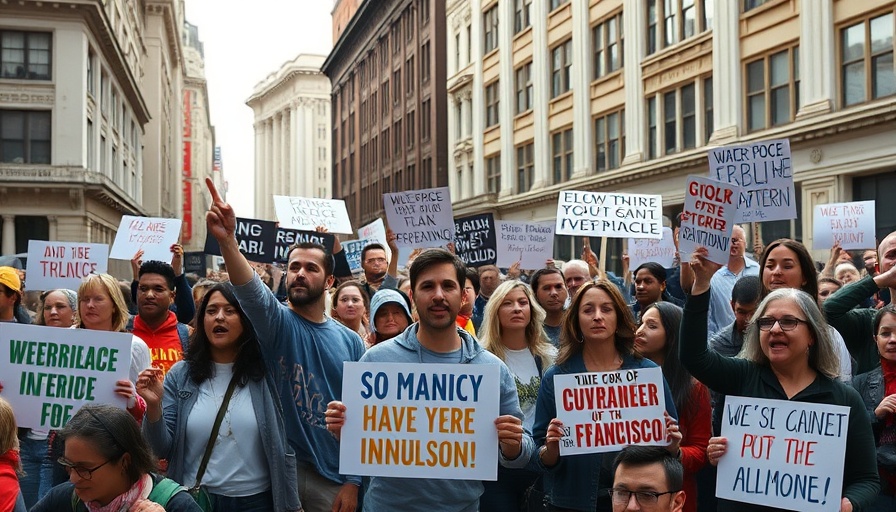
United in Spirit: Thousands March for Workers' Rights
On May Day, the heart of San Francisco resonated with the vibrant voices of thousands of protesters, uniting in a demonstration against the Trump administration's policies. This year's rally drew participants from various backgrounds, symbolizing collective frustration over labor issues, immigration reforms, and climate change. As banners waved and chants of solidarity filled the air, the event stood as a testament to the enduring power of grassroots movements in advocating for social justice.
Historical Context: The Roots of May Day
May Day, also known as International Workers' Day, has its origins tied to labor movements advocating for workers' rights dating back to the late 19th century. The events of Haymarket Square in 1886 marked a significant turning point, as workers sought to establish an eight-hour workday. Today, the day serves not only to remember those who fought for these rights but also to highlight ongoing struggles, as seen prominently in San Francisco.
Building a Coalition: Diverse Voices Join the March
The San Francisco rally was remarkably diverse, with various community organizations contributing to the demonstration's fabric. From immigrant rights advocates to environmental activists, the coalition showcased the intersectionality of the struggles faced by today’s workers. The involvement of families and individuals from the U.S., Canada, and beyond added global significance to local issues, illustrating how interconnected our social challenges have become.
Counterarguments: A Spectrum of Support and Criticism
While proponents of the rally emphasized the importance of standing against policies perceived as harmful to working families, critics argue that protests can sometimes alienate moderates who may otherwise support gradual reforms. This dichotomy highlights the need for dialogue and understanding within the labor movement about how best to advocate for change without risking division within their ranks.
Practical Insights: What Does This Mean for the Future of Labor?
The protests on May Day raise pressing questions about the direction of labor rights and social justice in the evolving political landscape. As wages stagnate and the gig economy transforms traditional employment, advocates must adapt their strategies to ensure all workers benefit from collective bargaining and protections against exploitation. Future movements may also focus heavily on digital organizing to reach a broader audience.
Emotional Impact: Personal Stories from the Rallies
Many attendees shared compelling personal stories that underscored their reasons for joining the demonstrations. For instance, families spoke of struggles with precarious employment, while long-time activists recounted their journeys toward advocacy. These emotional narratives reveal the deeply personal stakes involved in the fight for labor rights, enriching the overall experience of those gathered in solidarity.
Moving Forward: The Role of Local Communities in the Labor Movement
The effectiveness of rallies lies not only in the number of attendees but also in the ongoing activities that follow. Local communities must capitalize on the momentum generated by such events to engage in productive dialogues, workshops, and continued advocacy. Establishing committee-led initiatives may provide channels for ongoing participation and help sustain the energy of the movement.
Conclusion: The Power of Unity and Action
As the sun set over San Francisco, the echoes of the day's chants remained a powerful reminder of the ongoing struggles for workers' rights. The May Day rallies highlighted not just the issues at hand but showcased the strength found in unity. As we move forward, it is crucial for everyone, especially parents and individuals interested in activism, to stay informed, engaged, and empowered in advocating for equitable rights and justice.
Call to Action: As you reflect on the May Day movements, consider how you can contribute to these important causes in your community. Whether through participating in local advocacy groups, educating yourself about workers’ rights, or supporting businesses committed to fair practices, every action counts in the fight for social justice.
 Add Row
Add Row  Add
Add 




 Add Row
Add Row  Add
Add 

Write A Comment